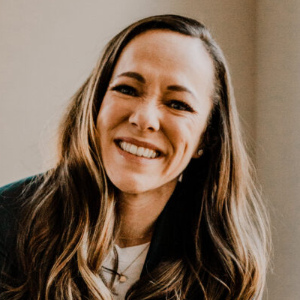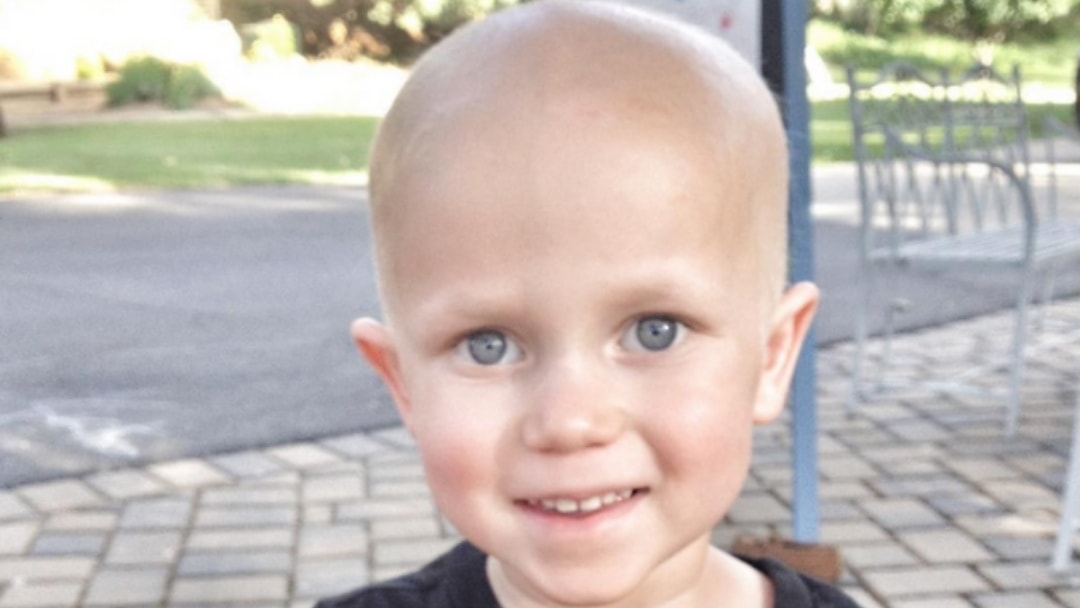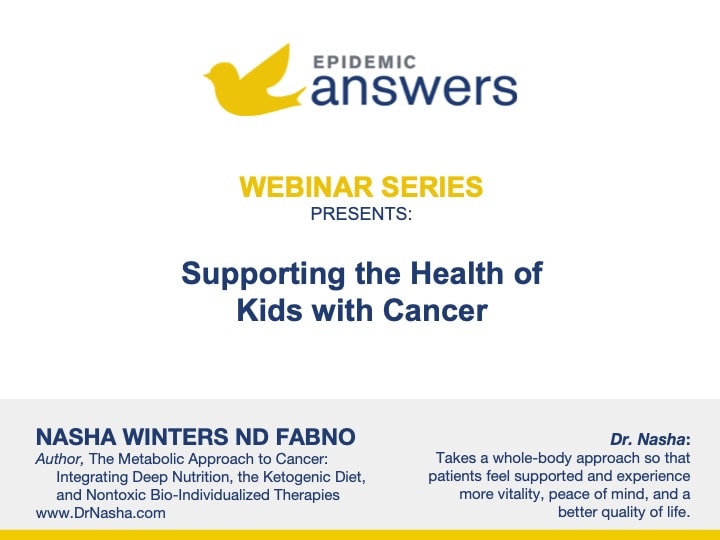We interviewed Season Johnson FMTP about the KICKcancER movement and using real food, real health and real life before and during pediatric cancer treatment. You can watch the replay below. Please note that you will be asked to provide your email address to continue viewing this video at the 30-minute mark.
In This Interview
Listen in to this inspiring and insightful conversation to hear about Season’s five pillars for thriving with cancer, which are:
- Nutrition: What we put in our bodies either fights or feeds disease. The majority of cancer cells use only sugar for fuel, although healthy cells can use either fat or sugar.
- Essential oils: Certain essential oils can help mitigate symptoms such as nausea, neuropathy, headaches, fatigue and appetite.
- Detoxification: It’s important to flush dead tumor waste out of the body because the number one side effect of conventional cancer treatment is secondary cancer.
- Greening your home and environment: Exposure to EMFs and toxic chemicals in everyday personal-care and cleaning products can hamper the body’s ability to heal.
- Self care: Stress from any and all sources (mental, emotional and physiological) can zap the body’s reserves and lower immunity.
About Season Johnson
Season Johnson is a Functional Nutritional Therapy Practitioner, Founder of The KICKcancER Movement, and a cancer momma who went from having one child with cancer to having thousands all over the world.
After her son was diagnosed with cancer at the age of two, she went through a 3.5 year cancer battle that included daily chemotherapy and hundreds of surgeries.
This propelled her with an unstoppable mission to help others thrive through a cancer diagnosis using real food, supplementation, detoxification, and cleaning up their environment.

She has received the coveted Weston A. Price Foundation Activist Award and the Children’s Health Advocate Award from the Nutritional Therapy Association for her work with pediatric cancer. And in 2019, she received the doTERRA Elevation Award for her dedication to helping families thrive through a cancer diagnosis through her non-profit.
She has had the privilege of being the Health and Wellness Expert for the Oscars and have partnered with the San Fransisco 49’ers, Atlanta Braves, and Washington Nationals in teaching them how to implement natural solutions into their healing protocol.
Through private nutrition coaching, online programs, speaking engagements, and a podcast, she continues to educate and empower others on how they can easily use real food and healthy living principals to achieve lifelong, vibrant health and thrive through a cancer diagnosis. You can find out more about her work at her websites, https://www.seasonjohnson.com/ and https://kickcancermovement.org/
Disclaimer
This webinar is not a substitute for medical advice, treatment, diagnosis, or consultation with a medical professional. It is intended for general informational purposes only and should not be relied on to make determinations related to treatment of a medical condition. Epidemic Answers has not verified and does not guaranty the accuracy of the information provided in this webinar.
Still Looking for Answers?
Visit the Epidemic Answers Practitioner Directory to find a practitioner near you.
Join us inside our online membership community for parents, Healing Together, where you’ll find even more healing resources, expert guidance, and a community to support you every step of your child’s healing journey.
Sources & References
Accurso, A., et al. Dietary carbohydrate restriction in type 2 diabetes mellitus and metabolic syndrome: time for a critical appraisal. Nutr Metab (Lond). 2008 Apr 8:5:9.
Aggarwal, B.B., et al. Molecular targets of dietary agents for prevention and therapy of cancer. Biochem Pharmacol. 2006 May 14;71(10):1397-421.
Allen, B.G., et al. Ketogenic diets as an adjuvant cancer therapy: History and potential mechanism. Redox Biol. 2014:2:963-70.
Anand, P., et al. Cancer is a preventable disease that requires major lifestyle changes. Pharm Res. 2008 Sep;25(9):2097-116.
Bahr, L.S., et al. Ketogenic diet and fasting diet as Nutritional Approaches in Multiple Sclerosis (NAMS): protocol of a randomized controlled study. Trials. 2020 Jan 2;21(1):3.
Coller, H.A. Is cancer a metabolic disease? Am J Pathol. 2014 Jan;184(1):4-17.
Duan, W., et al. Hyperglycemia, a neglected factor during cancer progression. Biomed Res Int. 2014:2014:461917.
Giovannucci, E., et al. Diabetes and cancer: a consensus report. Diabetes Care. 2010 Jul;33(7):1674-85.
Labbé, D.P., et al. Role of diet in prostate cancer: the epigenetic link. Oncogene. 2015 Sep 3;34(36):4683-91.
Liu, H., et al. Refined fructose and cancer. Expert Opin Ther Targets. 2011 Sep;15(9):1049-59.
Lombardi, C., et al. Residential proximity to pesticide application as a risk factor for childhood central nervous system tumors. Environ Res. 2021 Jun;197:111078.
Lorenzi, M., et al. High glucose induces DNA damage in cultured human endothelial cells. J Clin Invest. 1986 Jan;77(1):322-5.
Onodera, Y., et al. Increased sugar uptake promotes oncogenesis via EPAC/RAP1 and O-GlcNAc pathways. J Clin Invest. 2014 Jan;124(1):367-84.
Seyfried, T.N. Cancer as a metabolic disease. Nutr Metab (Lond). 2010 Jan 27:7:7.
Seyfried, T.N. Cancer as a metabolic disease: implications for novel therapeutics. Carcinogenesis. 2014 Mar;35(3):515-27.
Seyfried, T.N., et al. Consideration of Ketogenic Metabolic Therapy as a Complementary or Alternative Approach for Managing Breast Cancer. Front Nutr. 2020 Mar 11:7:21.
Seyfried, T.N., et al. Is the restricted ketogenic diet a viable alternative to the standard of care for managing malignant brain cancer? Epilepsy Res. 2012 Jul;100(3):310-26.
Seyfried, T.N., et al. Metabolic management of brain cancer. Biochim Biophys Acta. 2011 Jun;1807(6):577-94.
Takano, T., et al. Glutamate release promotes growth of malignant gliomas. Nat Med. 2001 Sep;7(9):1010-5.
Tinkum, K.L., et al. Fasting protects mice from lethal DNA damage by promoting small intestinal epithelial stem cell survival. Proc Natl Acad Sci U S A. 2015 Dec 22;112(51):E7148-54.
Resources
Books
Bernstein, Richard K. Dr. Bernstein’s Diabetes Solution: The Complete Guide to Achieving Normal Blood Sugars. Little, Brown Spark, 2011.
Seyfriend, Thomas. Cancer as a Metabolic Disease: On the Origin, Management, and Prevention of Cancer. Wiley, 2012.
Winters, Nasha. The Metabolic Approach to Cancer: Integrating Deep Nutrition, the Ketogenic Diet, and Nontoxic Bio-Individualized Therapies. Chelsea Green Publishing, 2017.
Websites
Dr. Bernstein’s Diabetes Solution



